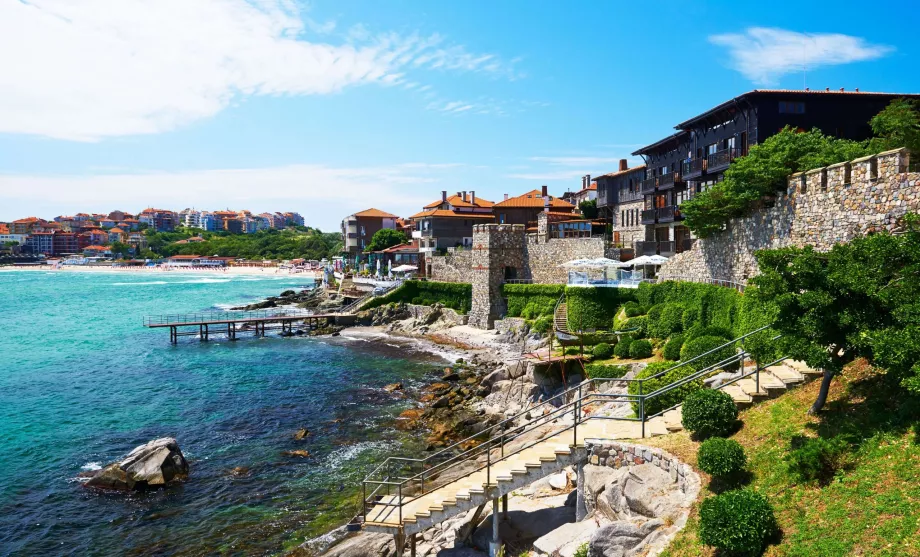It's worth travelling by car in Bulgaria if you want to explore the countryside or go to mountainous areas where public transport is very little frequented.
However, this article also describes the traffic regulations, how petrol stations work or how to pay tolls on motorways, so it is also for travellers coming to Bulgaria by their own car.
How and when to book a car in Bulgaria
When it comes to booking a car in car rental companies, generally the earlier you book, the cheaper it will be. This is also true in Bulgaria, although the differences are not as pronounced as in other European destinations.
For example, we recommend using Booking.com's comparison engine for all car rental companies, which will sort the results according to your chosen criteria.
Compare car rental prices - Booking.com
The best option is to rent a car directly at one of the international airports. Check the current availability and prices of cars.
- Car rental at Sofia Airport
- Car rental at Varna Airport
- Car rental in Burgas Airport
- Car rental in Plovdiv airport
Car rental prices in Bulgaria
Car rental in Bulgaria is one of the cheapest among European resorts. The price depends on the length of the rental, the longer the longer, the cheaper the daily rental price will be.
Significantly higher prices are in the summer, while in the winter car rental in Bulgaria is really a very cheap affair.
Examples of prices:
- 7-day rental in summer (Burgas or Varna) - from 250 eur
- 7-day rental in summer (Sofia or Plovdiv) - from 180 eur
- 7-day rental in winter (Burgas or Varna) - from 80 eur
- 7-day rental in winter (Sofia or Plovdiv) - from 80 eur
- Book a car in Bulgaria
Always read the detailed rental conditions and especially the insurance policy, which you can also find on Booking.com. Some rental companies include insurance in the final price, elsewhere you will have to pay extra, between 5 eur and 10 eur per day depending on the type of car and the length of the rental.
Returning a car in another location
As there are multiple airports in Bulgaria, many travellers prefer to rent a car at one and return it at the other end of the country.
Most rental companies charge high fees for returning the car in another location, around 100 eur.
International driving licence and other documents
Bulgaria is part of the European Union and therefore there is no need to get an international driving licence before travelling. The car rental company must also accept your classic European driving licence.
Car rental companies usually require a credit card to rent a car, but will often lend you a debit card, but either on less favourable terms or with a very high deposit often exceeding even 1 000 eur.
Highway charges
In Bulgaria, you need a vignette even to drive on most class I and II roads. Nowadays it exists only in the electronic version E-Vignette. Sticker vignettes have been abolished.
The easiest way to buy them is online at the official website bgtoll.bg, or at a machine where you enter the number plate and it automatically registers the payment. Vending machines can be found at all major petrol stations.
What are the prices of vignettes in Bulgaria and where do I have to pay? Find out in the detailed chapter - Motorway Stamps Bulgaria.
Petrol prices
Petrol in Bulgaria is generally cheaper than in Western or Southern Europe and cheaper than in Greece, Serbia or Romania.
The price ranges from 1,20 eur to 1,45 eur. You can see a price trend chart, for example, on the web: fuel-prices.eu/Bulgaria.
The density of petrol stations is very high and petrol stations are often located in very remote places and on secondary roads.
How do petrol stations work in Bulgaria?
Regular petrol is referred to as "95", while diesel is known at the pumps as "Diesel".
Almost all petrol stations in Bulgaria are self-service.
First you stop at a stand, pump yourself how much petrol you need, and then go to the shop to pay. At all petrol stations you can pay by card and cash.
Operation and traffic regulations
In Bulgaria, you drive on the right.
The rules here are very similar to those in other European countries and there is no need to prepare for any tricky situations.
Maximum speeds
Speed in Bulgaria is always stated in kilometres per hour. Very often the speeds are reduced by additional road signs.
- Cities and towns - 50 km/h
- Outside the village on normal roads - 90 km/h
- Expressways - 120 km/h
- Motorways - 140 km/h
Roundabouts
There are not many roundabouts in Bulgarian cities, and regular intersections with traffic lights are much more common.
The right of way is always given to a vehicle already travelling on a roundabout.
At a roundabout you are only obliged to signal when leaving the roundabout.
Advantages
In Bulgaria, the right-hand right of way applies at unmarked junctions. You will find such junctions especially in cities.
Pedestrians always have the right of way over motor vehicles at crossings. Conversely, a pedestrian must give way to a tram at a crossing.
Other rules
What are some other useful traffic rules?
- Blood alcohol is tolerated up to 0.05%
- Talking on the phone while driving is strictly forbidden and is often subject to police checks
- Headlights are required to be on all day and all year round


